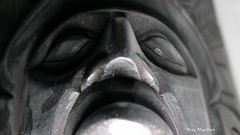Anglų - Lietuvių žodynas
Kompiuterinis žodynas internete nemokamai
masking
Masking tarimas:
/mæskɪŋ /
Masking audio:
Žodžio paaiškinimas anglų kalba:
- noun: A covering worn on the face to conceal one's identity, as:
- noun: A covering, as of cloth, that has openings for the eyes, entirely or partly conceals the face, and is worn especially at a masquerade ball.
- noun: A grotesque or comical representation of a face, worn especially to frighten or amuse, as at Halloween.
- noun: A facial covering worn for ritual.
- noun: A figure of a head worn by actors in Greek and Roman drama to identify a character or trait and to amplify the voice.
- noun: A protective covering for the face or head.
- noun: A gas mask.
- noun: A usually rubber frame forming a watertight seal around the eyes and nose and containing a transparent covering for use in seeing underwater.
- noun: A covering for the nose and mouth that is used for inhaling oxygen or an anesthetic.
- noun: A covering worn over the nose and mouth, as by a surgeon or dentist, to prevent infection.
- noun: A mold of a person's face, often made after death.
- noun: An often grotesque representation of a head and face, used for ornamentation.
- noun: The face or facial markings of certain animals, such as foxes or dogs.
- noun: A face having a blank, fixed, or enigmatic expression.
- noun: Something, often a trait, that disguises or conceals: "If ever I saw misery under a mask, it was on her face” ( Erskine Childers).
- noun: A natural or artificial feature of terrain that conceals and protects military forces or installations.
- noun: An opaque border or pattern placed between a source of light and a photosensitive surface to prevent exposure of specified portions of the surface.
- noun: The translucent border framing a television picture tube and screen.
- noun: Computer Science A pattern of characters, bits, or bytes used to control the elimination or retention of another pattern of characters, bits, or bytes.
- noun: A cosmetic preparation that is applied to the face and allowed to dry before being removed, used especially for cleansing and tightening the skin.
- noun: Variant of
masque . - noun: A person wearing a mask.
- verb-transitive: To cover with a decorative or protective mask.
- verb-transitive: To make indistinct or blurred to the senses: spices that mask the strong flavor of the meat.
- verb-transitive: To cover in order to conceal, protect, or disguise. See Synonyms at
disguise . - verb-transitive: To block the view of: Undergrowth masked the entrance to the cave.
- verb-transitive: To cover (a part of a photographic film) by the application of an opaque border.
- verb-transitive: Chemistry To prevent (an atom or a group of atoms) from taking part in a normal reaction.
- verb-intransitive: To put on a mask, especially for a masquerade ball.
- verb-intransitive: To conceal one's real personality, character, or intentions.
Lietuviškos reikšmės:
- kvapų
Žodyno testas
Ką reiškia lietuviškai?
Parinkite teisingą atsakymą
abase
/ə'beis/

